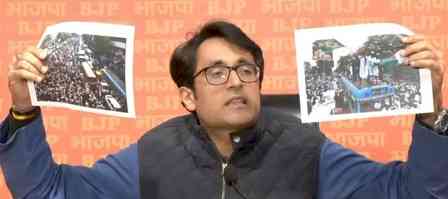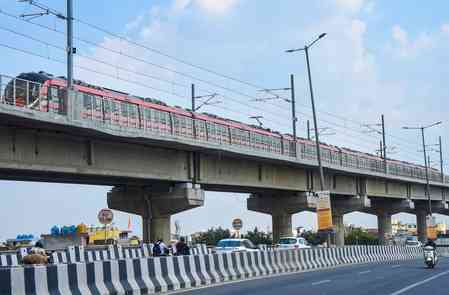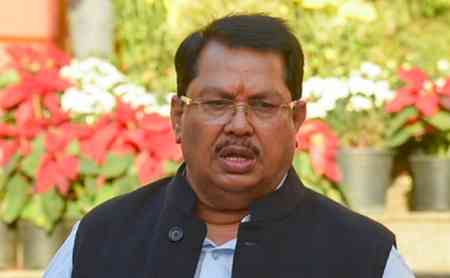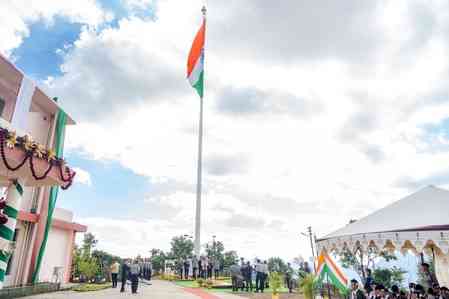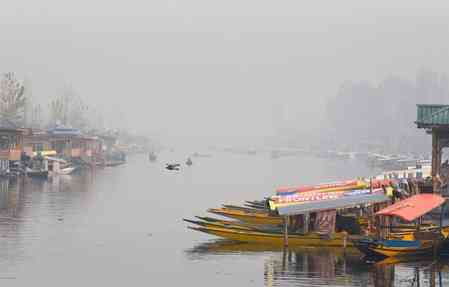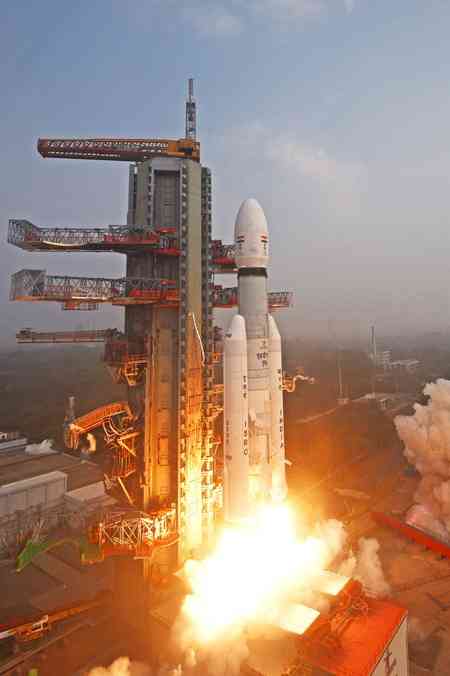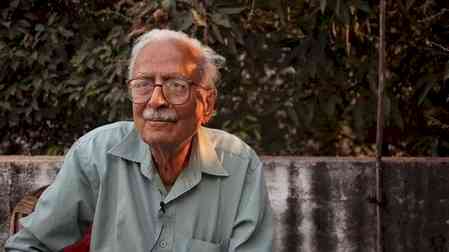Cong leaders became police informer during Emergency: Rambahadur Rai
Editor-in-chief of Hindusthan Samachar Rambahadur Rai said on Sunday that Congress leaders and workers had become police informers during the Emergency.

New Delhi, 25 June (HS): Editor-in-chief of Hindusthan Samachar Rambahadur Rai said on Sunday that Congress leaders and workers had become police informers during the Emergency.
This disclosure was made by Rai in a seminar organised by NUJI School of Journalism and Communication and Delhi Journalists Association on the topic of Emergency and Press.
The senior journalist, who was jailed for 16 months during the Emergency, told that many people were arrested and jailed under the pressure of the Congress leaders. He also disclosed that Acharya Vinoba Bhave had never said that Emergency is a festival of discipline. Vinoba Bhave could not oppose the lies spread by Congress leader Nirmala Deshpande because of the fear prevailing during the Emergency.
In the seminar held in Delhi, senior journalist Dr. Alok Mehta, Editorial Director of ITV, Hitesh Shankar, Editor of Panchjanya and many other journalists expressed their views. The seminar was presided over by Ras Bihari, President of the National union of Journalists.
Rai told in the seminar that only the volunteers of Rashtriya Swayamsevak Sangh strongly opposed the Emergency. Jayaprakash Narayan, the leader of the movement against Indira Gandhi, was disheartened by the silence prevailing after his arrest. JP expected that after his arrest, there would be huge protest across the country including Patna. But there was complete silence in the country.
He told that JP started writing his diary after a month in jail. In the first five months of the Emergency, the country was shaken by the atrocities of the Indira government. After this, to remove the fear, the volunteers of the Sangh went underground and worked against the Emergency. He also revealed that revolutionary Maoist leaders and activists had also played the role of informers for the government and the police during the Emergency. Jailed Maoist leaders used to spy on the arrested leaders.
Rambahadur Rai, who played a major role in the JP movement, said that the JP movement did not have the power to change power in protest against Indira Gandhi. He said that there was such an atmosphere in the jails that the emergency would never end and the family members would not meet in this life.
Rai said that Indira Gandhi had announced the Lok Sabha elections in January 1977 thinking that the public would approve of her decision during the Emergency. He told that Indira Gandhi got the elections done on the advice of philosopher J Krishnamurthy, Congress leader Om Mehta and many others. Indira Gandhi had thought that by holding elections in emergency, she would win again, but the people ruined her plans.
Rai said that Indira Gandhi had declared emergency only to remain prime minister. If Indira Gandhi would have got relief from the Supreme Court, even emergency would not have been imposed. For this, Indira Gandhi violated all democratic rights.
Alok Mehta said that at present a misconception is being spread among journalists that there is an emergency like situation in the country. He said that even today the media has full freedom to publish news on the basis of facts. He said that Indira Gandhi used to say that we are not as much threatened by Jayaprakash's movement as we are from newspapers.
Mehta said that during the Emergency, there was a ban on slum removal, non-payment of bonus to workers and even writing news on the Godavari water crisis. Government officials and courtiers had become more loyal to the king.
Mehta, who was a correspondent with Hindusthan News Agency during the Emergency, shared many of his experiences on the occasion.
Mehta said that during the Emergency, journalists had played a big role in keeping democracy alive. For this reason, all the journalists had to bear the displeasure of Indira Sarkar. Censorship was completely misused by the Indira government to suppress the press. Government officials and courtiers had become more loyal to the king. Emergency has given a big lesson that now no government can even think about it. Indira played country band to become a brand: Hitesh Shankar
Panchjanya editor Hitesh Shankar said that what is important is the media's view of the Emergency. He said that the Emergency was declared after the judgment of the Allahabad High Court on June 12, 1975 disqualifying Indira Gandhi for six years. Its seeds were sown as early as 1967, when the Supreme Court in the famous Golaknath vs State of Punjab case ruled that fundamental rights of individuals cannot be curtailed.
Hitesh Shankar said that after Mrs. Gandhi came to power, nationalization of banks, abolition of privy purses, emphasis on the need for a committed judiciary and bureaucracy by the then Prime Minister reflected the mindset of the then rulers. He said that the basic structure of which constitution cannot be changed by this arrangement of the court again in the Kesavanand Bharti case. After that the effort to mold the constitution according to the will of the rulers intensified. Those who were not bowing down before the family, efforts were made to make them bow down.
Hitesh Shankar said that during the Emergency more than two hundred journalists were arrested and put in jails. He said that the general elections held after the Emergency had decided that this country is not run by the whims of power but by the Constitution. NUJ played a big role against the ban on the press during the Emergency- Ras Bihari
Presiding over the seminar, NUJI President Ras Bihari said that during the Emergency, NUJI leaders had played a big role in opposing the ban on the press. Many leaders were arrested and put in jail. Recognition of a large number of members was cancelled. Many journalists were fired from their jobs.
Describing the undeclared emergency on the media in the country as a conspiracy to spread confusion, Rasbihari said that the media would face challenges all the time. Owners' arbitrariness dominates in media institutions and today editors have become managers. The media establishment which is said to be pro-BJP in Delhi is called the mouthpiece of Chief Minister Mamata Banerjee in West Bengal. Those who write news based on facts about power may have to face trouble but they cannot be silenced. He said that whether it is Kejriwal government of Delhi or Nitish Kumar government of Bihar, advertisements are stopped for criticizing them. This is the situation in many states. He said that the illusion of undeclared emergency is being spread only because of the owners publishing or not publishing the news.
Anil Pandey, President, NUJI School of Journalism and Communication, while introducing the speakers of the seminar, spoke about their contribution to media freedom. KP Malik, Secretary, NUJI School, welcomed the guests present at the seminar.
Rakesh Thapliyal, convenor of Delhi Journalist Association, raised the issues related to media while conducting the seminar. NUJI Secretary Amlesh Raju said in the vote of thanks that there is a need for the media to work unitedly. Senior anchors of Sansad TV Manoj Verma, Amarendra Gupta, bureau chief of Univarta Manohar Singh, senior journalists Usha Pahwa, Pratibha Shukla, Gyanendra Singh, Vivek Shukla, Deepak Upadhyay etc. also presented their views in the seminar. A large number of journalists participated in the seminar.
Hindusthan Samachar/Anoop


 Hindusthan Samachar
Hindusthan Samachar 
